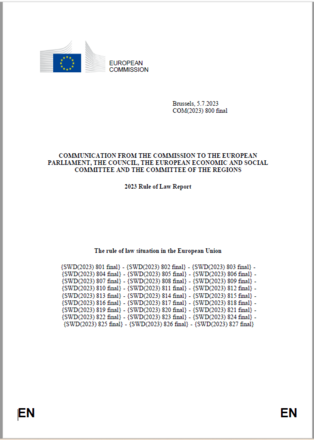
The 2023 Rule of Law report assesses the rule of law in all EU member states, to detect and prevent key challenges and recommend potential reforms in four core pillars: the justice system, the anti-corruption framework, media freedom and pluralism, and institutional issues related to checks and balances. In this year’s report, the European Commission positively notes that – albeit to different degrees – member states followed up on ca. two-thirds of the 2022 recommendations.
Independent and effective justice systems are essential to ensure the well functioning of the European legal order. While the Commission welcomes the initiation of positive reforms in key areas in some member states – e.g. regarding the Councils for the Judiciary, prosecution services, or the right to access to justice, it warns that concerns remain for some countries, especially when it comes to judicial independence and the efficiency of justice, including the length of proceedings and the allocation of adequate resources.
Widespread corruption remains a key challenge across the EU and a serious concern for European citizens and businesses. Measures to prevent corruption and promote integrity in public life include addressing conflicts of interest between public and private parties, regulating lobbying, and enhancing transparency in political party financing. While some member states have strengthened their anti-corruption framework, other countries still lag behind and need to accelerate their reform process. Italy, for example, has yet to introduce comprehensive rules on conflict of interests and lobbying. The Commission welcomes positive developments regarding the transposition of the Directive on whistleblower protection, although it warns that in many countries major obstacles still block the reporting of corruption cases.
Independent and free media are crucial to hold institutions accountable. The Commission recognises the effort of some member states in aligning with the 2022 recommendation regarding the transparency of media ownership and safeguards from political pressure and influence. Yet, in some countries, the situation remains quite concerning, e.g. in Hungary, where no measures have been adopted to regulate the channeling of state advertising to media outlets. The safety and protection of journalists remain a concerning issue at the European level; the Commission stresses, in particular, the need to introduce effective measures to counter SLAPPs, including reforms of defamation laws.
In terms of institutional issues related to checks and balances, the Commission stresses the need to strengthen the role of National Human Rights Institutions, Ombudspersons, and equality bodies as key actors to uphold fundamental rights and EU values at the national level. The Commission also warns about the continuous shrinking of civic space and the alleged illegal use of spyware in some countries such as Hungary and Poland, which poses serious threats to the security of journalists, human rights defenders, and, ultimately, all citizens.
Tags: Rule of Law European policies and legislationThe content of this article can be used according to the terms of Creative Commons: Attribution-NonCommercial 4.0 International (CC BY-NC 4.0) . To do so use the the wording "this article was originally published on the Resource Centre on Media Freedom in Europe" including a direct active link to the original article page.

